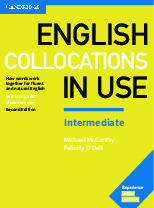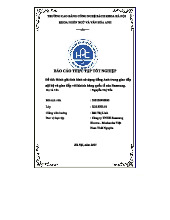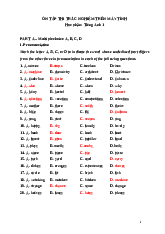




Preview text:
lOMoAR cPSD| 45254322
WRITING HANDOUTS FOR TAB1
INFORMAL LETTERS/EMAILS
An informal letter/email or a personal letter/email is a letter/email to a close friend or an
acquaintance. Isn’t it wonderful to receive such a letter/email from a friend? Better yet, isn’t it
wonderful to actually write one?
Let’s start a tour from here!
You have received the following email from your English-speaking friend Kathy. From: Kathy Subject: Touring trip
My boyfriend and I have a week o wor
k, and have decided to visit your area. We
would like to travel around and see any places of interest , and maybe learn a bit about its history .
Is there anywhere you would recommend we visit? And what’s the best way to get around -
should we hire a car? Or can we travel by bus, train, or even by bicycle ? Thanks, Kathy
Write your email response in 140-190 words.
When planning your response to the above email, it is advisable to underline the questions
you should be answering directly ( as illustrated above), and make sure you include any other
requested information
And here is the reply from Rhett Hi Kathy, I hope you are well.
I’m happy to hear that you’re finally coming here! There’s a lot to do and see, and I think
you’ll really enjoy yourselves!
Firstly, as you know, South Africa is famous for wildlife. I strongly suggest that you hire a car
as soon as you can and drive to the Kruger National Park, which is about 5 hours North of 4 lOMoAR cPSD| 45254322
WRITING HANDOUTS FOR TAB1
Johannesburg. It may sound like a long drive, but I promise you it will be worth your while when
you see all the wild animals in their natural habitat!
When you are back in Johannesburg, why don’t you try eating dinner at “Greensleeves”
restaurant, where they will serve you many di erent kinds of roasted local meats, includingff Kudu and Impala!
Also, I’m sure you’ll enjoy visiting “Gold Reef city,” where you can go 300 meters
underground in a lift, to the bottom of a real gold mine, and learn about the history of
Johannesburg and its connection to gold mining.
Anyway, I’ll put some more thought into it, and send you some more suggestions when I have time. All the best, Rhett (190 words)
Now you can see three main parts of an informal letter/email. 1. Salutation (Greeting)
Although you can start with “Dear,” these days people usually start informal letters or emails
with “Hi ……, Hello……..,” or even “Hey”
Using a comma after the person’s name is recommended too: • Hi Emma, • Hello Frank,
You should start with a casually polite question about the person, or comment regarding the person you are writing to: • I hope you are well. •
It’s great to hear from you! • How’s it going? • How are you doing? •
What’s happening? (slang)
*These are not your only options, but they are the most common Example: Hi Kathy, I hope you are well. 4 lOMoAR cPSD| 45254322
WRITING HANDOUTS FOR TAB1 2. The Body a. Introductory paragraph
Firstly, acknowledge that you have read their previous letter/email, and are responding to it: •
I’m glad to hear that (about)….. • Great news about…. •
I’m happy to hear that (about)…. • I’m excited that….
*The above phrases are for positive news only. For negative news, there are other
acknowledgements you can use. Example: Hi Kathy, I hope you are well.
I’m happy to hear that you are finally coming here! There’s a lot to do and see, and I think
you’ll really enjoy yourselves!
b. Main Paragraphs (Making Suggestions and Recommendations)
Each paragraph should focus on one idea. When you move onto you next idea, start a new
paragraph. The following language is useful for making suggestions and recommendations: •
I recommend (that) you…… •
I (really) think you would enjoy…. •
I (strongly) suggest (that)…. • Why don’t you…… •
How about (verb+ing) •
Don’t forget to (go/try/visit)…. •
You must (go/try/visit)….. • Don't miss……..
c. Using Conjunctions
To add information or add details to your sentences, use conjunctions such as: and, but, so, 4 lOMoAR cPSD| 45254322
WRITING HANDOUTS FOR TAB1
either, as soon as, whereas, although …
Recommend and suggest must be followed by ( subject) + verb+ing.
I recommend (that) you rent a car. I recommend renting a car.
I recommend you go fishing in the river.
NOT WITH THE INFINITIVE:
I recommend you to rent a car.
I recommend you to go fishing in the river.
* recommend can be replaced by suggest in all of the above examples 4 . Informal language notes
- Remember you are writing to someone you know very well, so try to be as friendly as possible:
How are you my dear sister?
- If you are writing to an adult that you respect, like your dad, try not to write things like: “What’s
up dude!” or “What’s going down?” Try to picture the person you are writing to standing in front
of you. Imagine the things that you would say to him and write them down. - You are allowed to
use colloquial language – i.e. language that is appropriate for speech but not really for writing:
My journey back here was fine, though it was quite a long one. I wanted to travel by CR bus but
guess what; all the wretched buses were full! So I had no choice but to travel by a small Rosa
bus. The journey took seven hours. By the time we reached, my legs were tried and my bottom
was severely sore, ugh! Next time, I promise, I’m not gonna use one of those tiny buses!
- It is always a good idea to ask questions in the body of the letter that you would like the personto
answer in their reply. Questions work as a good base on which to write a letter, and they give the
recipient motivation to reply: How are those wonderful brothers of mine? Did I tell you that I am librarian too, eh Practice 1
You should spend about 20 minutes on this task.
You received an email from your English friend, Allie. She asked you for some information
about your house. Read part of her email below.
I am going to take a two-year intensive course in Vietnamese language in Hanoi next month. I
want to look for an apartment near the university. My friend said that you have a flat for rent.
Can you tell me a bit about your flat (things like number of rooms, its special features, the
price and the neighborhood)? I want to see if the house will be suitable for me. 4 lOMoAR cPSD| 45254322
WRITING HANDOUTS FOR TAB1
Write a letter responding to Allie. Practice 2
You should spend 20 minutes on this task.
You received an email from your English – speaking friend, Tom. He asked you for some
information about your favorite restaurant. This is a part of his email.
A new restaurant has just opened in my town and it’s wonderful. Have you got a favorite
restaurant? Tell me about it. Where is it located? What kind of restaurant is it? How are the
food and the service? And what do you like most about that restaurant?
Write an email responding to Tom. 4




